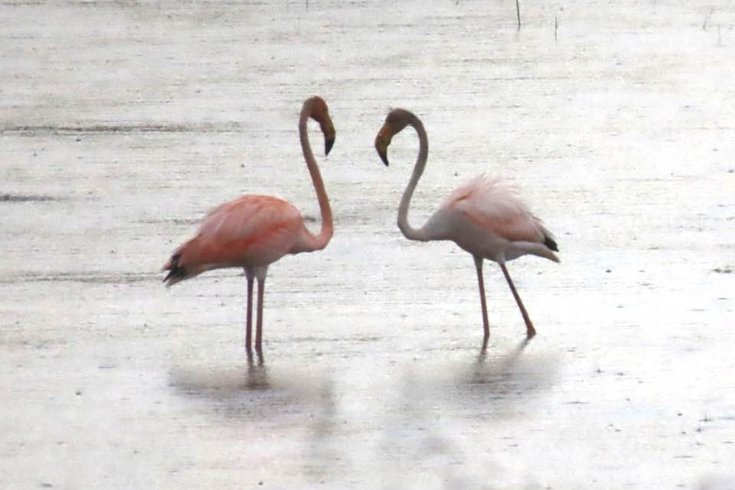
September 12, 2023
 Provided Image/Scott Lewis
Provided Image/Scott Lewis
Two American flamingos are shown above at Long Lane Pond in St. Thomas Township, Pennsylvania. The birds are the first of their kind recorded in Pennsylvania. One of them was injured by a snapping turtle on Monday.
Days after a pair of flamingos were spotted in Pennsylvania for the first time, one of the two birds visiting from Florida is being treated for injuries suffered in an attack by a snapping turtle, according to state wildlife officials.
Last week, the two American flamingos were observed swimming at Long Lane Pond in St. Thomas, Franklin County, about 170 miles west of Philadelphia. The pink shorebirds are believed to have been blown off course after Hurricane Idalia made landfall in Florida in late August. The species is typically only found in Florida and Caribbean countries, but they have been identified in at least 10 states to the north since the start of September.
The pair at Long Lane Pond stuck around through the weekend, attracting avid bird-watchers to the area to look at the rare sight.
On Monday morning, one of the two flamingos was placed in the care of an animal rehab center after a snapping turtle attacked its leg. The Pennsylvania Game Commission got a call about an injured flamingo that was struggling at the pond.
“It couldn’t get the snapping turtle off,” said Amy Nabozny, an information education supervisor for the Game Commission's south-central region.
The flamingo was freed from the snapping turtle's grip by a birder. Photos shared on the Shippensberg Neighbors Facebook page show the bird being carried away by a game warden, who drove it to Raven Ridge Wildlife Center outside Lancaster.
The Game Commission could not yet determine the severity of the flamingo's injury, but said it did not appear to be life-threatening. Nabozny didn't know whether the injured bird is male or female.
A speedy recovery is of particular urgency as flamingos are known to form lifelong mating partnerships. The Game Commission hopes that the uninjured flamingo will stick around long enough for its mate to be returned. Usually, flamingos will only abandon their mates if they are killed or go missing for extended periods of time.
"We're hoping that this one can be rehabbed within a short period of time (so we can) get it back with its mate," Nabozny said. "It's hard to say. Being an animal that's not familiar with this area, it's always a concern how long (the uninjured bird) will stay. If it's even more out of its element because the one familiar thing that it had is now lost, that's another concern. Flamingos don't like to be solitary. They like to be in pairs or groups."
Snapping turtles are widespread in Pennsylvania's lakes, ponds and waterways. The species has a strong jaw designed to clamp down on prey. The turtles often hunt insects, fish, amphibians, birds and even small mammals by ambushing them. A flamingo is larger than what it would usually try to hunt.
"If you have something that's kind of a novice to the area, it isn't uncommon for a predator to kind of investigate and try to take that as prey," Nabozny said. "If it's just seeing the leg underwater, obviously it's going to appear much smaller-sized. It's not uncommon for them to get smaller prey like goslings, ducklings, sometimes adult ducks and geese."
By the time a game warden arrived at the pond on Monday, the injured flamingo was already out of the water and people there had wrapped gauze around its leg.
"I have no idea how the individual got (the snapping turtle) off," Nabozny said.
Some wildlife experts predicted last week that the displaced flamingos would soon return to Florida. The uninjured flamingo remained at Long Lane Pond on Monday. The Game Commission sometimes sees other bird species make temporary dwellings in parts of the state where they are not native.
"Sometimes it's just that they hang out long enough for them to rebuild their strength," Nabozny said. "If there's a good food source, they may stay longer."
Nobozny said working with a flamingo is an uncommon experience for game wardens, but that they're prepared to deal with unpredictable scenarios involving wildlife.
"Nature can be cruel, unfortunately. But it is part of the process," Nabozny said. "As humans, we always like to see a happy ending to a story, so hopefully this one has one."